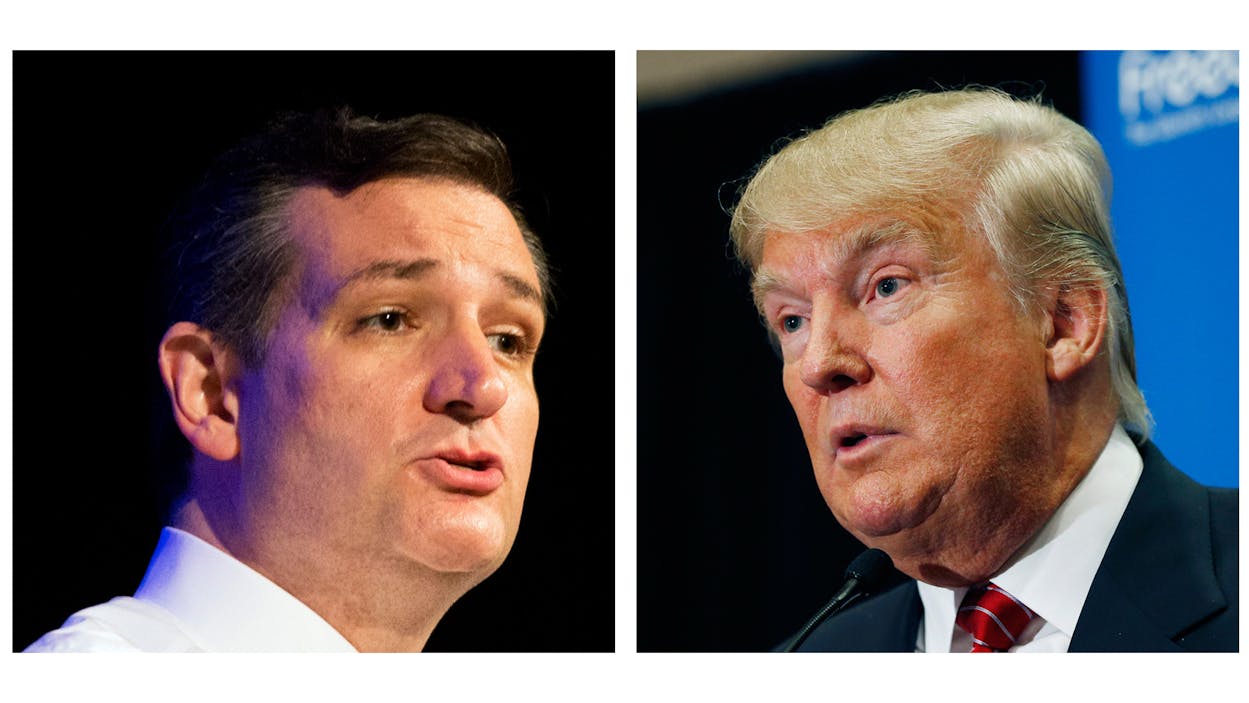No one threads a needle as deftly as Ted Cruz, and it’s been evident enough since he announced his presidential run, at Liberty University, that this skill would be a crucial component of his campaign strategy. It was bound to be a crowded field, at least on the Republican side, and none of the likely challengers seemed like a sure bet for the nomination. Anyone would have anticipated a long campaign, and Cruz would have approached his with an effort to ensure that eventual defections from other candidates would accrue to his advantage. He is still, to my knowledge, the only Republican in high office who was endorsed by both Rand Paul and Rick Santorum during a contested primary, in 2012; both men are among his current competitors, and it’s reasonable to posit that Cruz is the logical second choice of either one’s supporters.
Cruz’s camaraderie with Donald Trump, as laid out by Tim Mak at the Daily Beast, is in keeping with that strategy:
Donald Trump and Ted Cruz’s mutual admiration is turning into a conservative bromance—one that could have a huge strategic payoff for the Texas senator’s presidential campaign.
Behind the scenes, Cruz has been methodologically developing Trump’s support. The two candidates have met in person at least five times and talk by phone occasionally. And in the future, they may even hold events together.
As Mak says, the bromance could have a strategic payoff for Cruz down the line. As it stands, though, I think Trump’s popularity complicates the senator’s strategy in three ways.
First: Trump is the frontrunner, by a considerable margin. Cruz is doing well, in a sense; he’s in third place, polling at around 10 percent. Since the candidates he’s trailing are Trump and Ben Carson, there’s a sense, among some Republicans, that—showbiz aside—Cruz is effectively the frontrunner. (Among Democrats, perhaps, too; as Vox’s Matt Yglesias put it a couple of days ago, Cruz is a “real politician,” and is the frontrunner in that subset of the field.) But Trump remains the clear frontrunner and has been for a month, despite near-saturation level coverage. He may well self-destruct. But considering that he hasn’t done so yet, I don’t think Republicans can go on assuming that relief is inevitable. As for Cruz, he can’t exactly roll up Trump’s supporters as long as they’re supporting Trump.
That problem, at least, has an easy solution; it ends when Trump’s candidacy does. The second problem doesn’t. By cultivating such a close association, Cruz is implicating himself with all the nonsense Trump is already known to stand for, and the as yet unforeseen nonsense he’s bound to produce by the end of this cruel joke of a campaign. In other words, Cruz’s strategy exposes his reputation to serious risk. He’s already framed his chumminess with Trump as consistent with his stated commitment to never speak ill of another Republican. This is a claim that has, in the past, riled plenty of people, including some of Cruz’s own colleagues in Congress, who consider it disingenuous. And it’s an especially flimsy alibi under the circumstances. Trump is the nation’s foremost Eleventh Commandment scofflaw. And Cruz is demonstrably too smart to believe that Trump, who he’s called “terrific,” is the blameless victim of the media elite and Washington establishment.
The bromance may have practical implications too. If Cruz ends up seeking an endorsement, Trump would no doubt approach the discussion as a negotiation. As for Trump’s supporters? As we’ve seen in Texas, plenty of today’s right-wing voters feel entitled to hold their candidates accountable, even for promises that the candidate in question didn’t actually make.
The third problem may sound quaint, but given that the overarching purpose of Cruz’s deal-with-the-devil strategy is to become president of the United States, I think it’s worth pointing out: there’s an opportunity cost here. I have no doubt that Cruz is blisteringly shrewd, and I remain optimistic about his potential, because the first time I met him, at an event in Fort Worth in 2009 or 2010, he was talking about John Rawls and job creation data from the Dallas Fed. At the same time, seven years into the Obama administration, it’s abundantly clear that being president is harder than it looks, even for a smart guy who gives good speeches.
Cruz—like Obama in 2008—is a first-term senator with only three years of experience in national politics. So the presidential campaign itself would seem like a crucial opportunity to substantiate his credentials for the presidency, rather than just the campaign. But as a result of the Trump strategy, it’s a missed opportunity thus far. Cruz is effectively corroborating Trump’s claim that America isn’t working, which means that he’s relinquishing the chance to tell voters about his home state of Texas, and the role he might assert in its record, having served as solicitor general from 2003 to 2008. And the strategy is preventing Cruz from showing certain skills that would serve a president well, such as persuasion and leadership. He may well have the capacity for both, but I’m not sure how many Americans would take that on faith–and the longer the bromance endures, the less reason they have ask themselves if they should.







